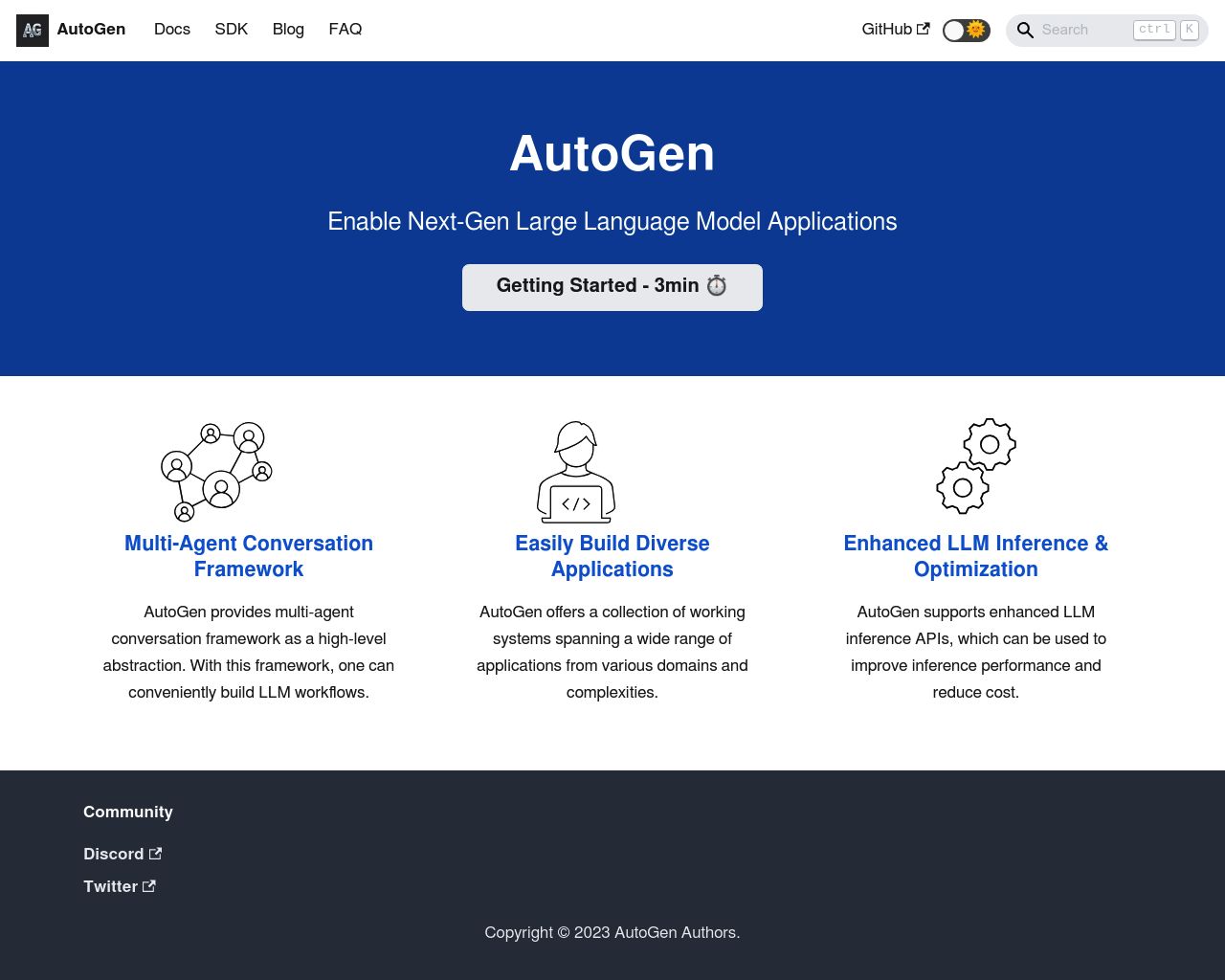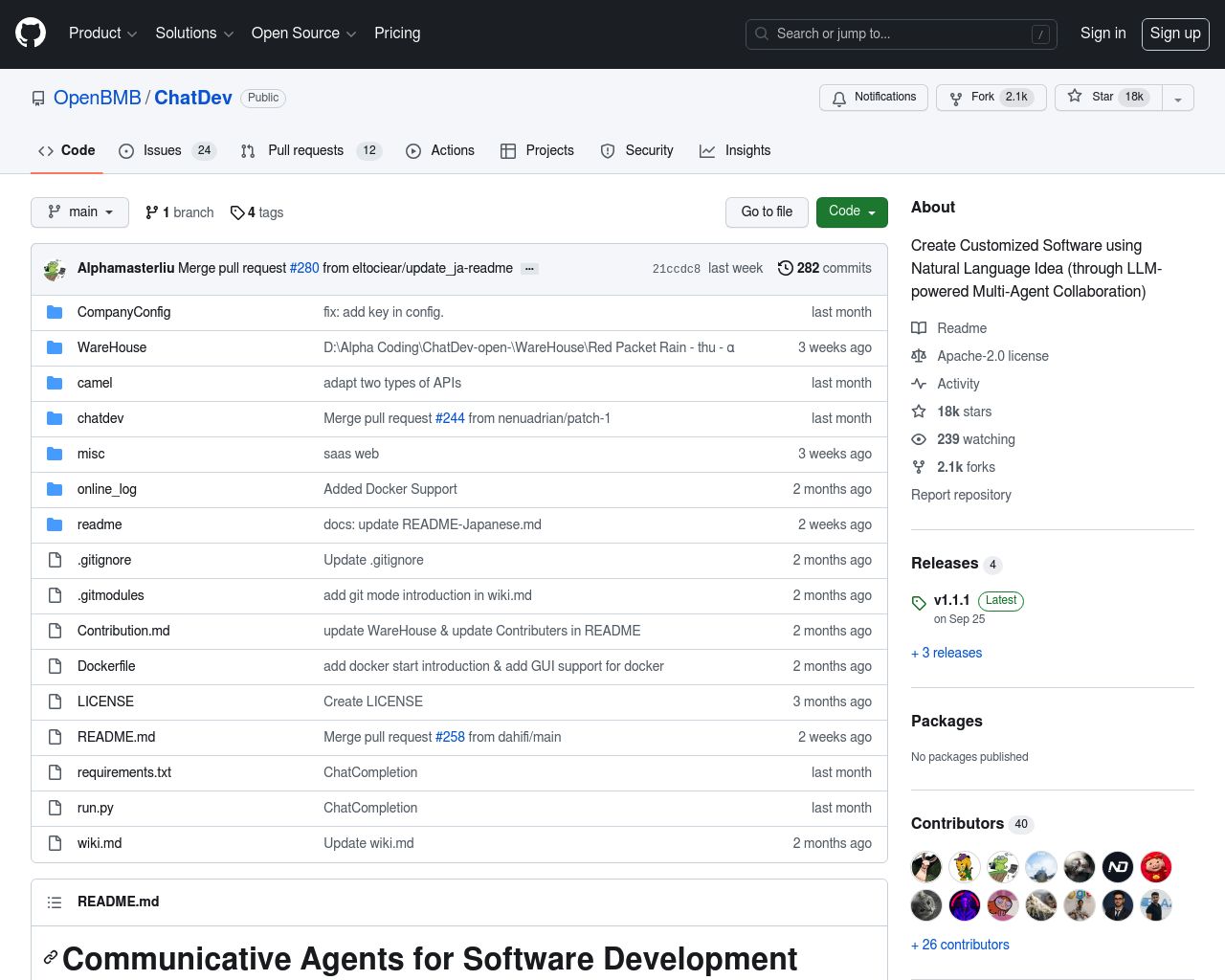A comprehensive comparison of AutoGen Vs ChatDev
AI agent builders revolutionize software development, offering powerful tools to create sophisticated applications. AutoGen and ChatDev lead this innovation, each with unique strengths. AutoGen excels in multi-agent collaboration, while ChatDev automates entire development processes. This comparison explores their features, capabilities, and limitations, highlighting how SmythOS emerges as a superior alternative. We’ll examine visual building tools, security features, and deployment options, providing developers and business leaders with crucial insights to make informed decisions about AI integration in their projects.
AutoGen Overview
AutoGen empowers developers to create sophisticated Large Language Model (LLM) applications through multi-agent conversations. The framework enables customizable agents to interact with each other, LLMs, tools, and humans to tackle complex tasks.


AutoGen’s core strength lies in its multi-agent conversation system. Agents collaborate autonomously or with human input to solve problems, adapting to various use cases. The framework optimizes LLM performance through enhanced inference capabilities, including tuning, caching, error handling, and templating.
AutoGen empowers developers to create sophisticated Large Language Model (LLM) applications through multi-agent conversations.
Developers can tailor agents to specific needs, integrating LLMs, human inputs, and tools. AutoGen supports both fully autonomous operations and human-in-the-loop problem-solving, offering flexibility for applications requiring human oversight. The platform demonstrates effectiveness across diverse applications, from automated task solving to complex problem-solving in group chats.
AutoGen provides essential debugging tools and logging functionalities for API calls, crucial for optimizing LLM-based systems. The inclusion of EcoOptiGen, a cost-effective technique for tuning large language models, underscores AutoGen’s commitment to enhancing LLM efficiency and effectiveness.
While AutoGen offers powerful capabilities, it requires coding knowledge for setup and configuration. The lack of a visual builder or no-code editor may present a learning curve for non-technical users. However, its flexibility and support for various LLM models and APIs make it a versatile choice for developers and organizations seeking to leverage advanced AI capabilities in their projects.
ChatDev Overview
ChatDev revolutionizes software development by automating the entire process using large language models (LLMs). This open-source framework simulates a virtual software company, employing intelligent agents to collaborate on various development tasks.
At its core, ChatDev leverages LLMs to handle everything from design and coding to testing and documentation. The system operates through a multi-agent approach, with each agent taking on a specific role typically found in software development teams. These agents communicate and work together via a structured chat chain, breaking down complex projects into manageable tasks.
ChatDev revolutionizes software development by automating the entire process using large language models (LLMs). This open-source framework simulates a virtual software company…
ChatDev stands out for its ability to deliver complete software applications in remarkably short timeframes and at low costs. For example, it can develop a simple game in under seven minutes for less than a dollar. The framework generates all necessary components, including source code, user manuals, and environmental dependencies.


One of ChatDev’s unique features is its transparency. Users can replay the entire conversation between agents in a web app, providing insight into the development process. The framework also employs innovative mechanisms like thought instructions and self-reflection to minimize errors and improve code quality.
ChatDev stands out for its ability to deliver complete software applications in remarkably short timeframes and at low costs. For example, it can develop a simple game in under seven minutes for less than a dollar.
While ChatDev offers powerful automation capabilities, it lacks some features found in more comprehensive AI agent builders. It doesn’t provide a visual builder or no-code editor, which may limit accessibility for non-technical users. Additionally, there’s no mention of specific data encryption features or support for staging and production domains, which could be concerns for enterprise-level deployments.
Despite these limitations, ChatDev’s vision of revolutionizing software development through AI automation positions it as a valuable tool for developers and companies looking to streamline their processes. Its ability to significantly reduce development time and costs makes it an attractive option for rapid prototyping and small to medium-scale projects.
Feature Comparison
AutoGen and ChatDev both offer powerful AI agent capabilities, but significant differences exist in their core components and security features. AutoGen excels in multi-agent collaboration, allowing teams of AI agents to work together on complex tasks. It provides robust debugging tools and logging functionalities, crucial for optimizing LLM-based systems. However, AutoGen lacks a visual builder or no-code editor, requiring coding knowledge for setup and configuration.
ChatDev, on the other hand, focuses on automating the entire software development process. It simulates a virtual software company with agents taking on specific development roles. ChatDev stands out for its ability to deliver complete applications rapidly and at low cost. However, it lacks features like data encryption, staging domains, and comprehensive API authentication options. Unlike AutoGen, ChatDev doesn’t offer explicit support for human-AI interaction or audit logs for analytics.
While both platforms support autonomous agents and problem-solving capabilities, SmythOS outperforms in areas like visual building, no-code editing, and deployment flexibility. SmythOS offers superior security features, including data encryption and OAuth support, addressing enterprise-level concerns more comprehensively than either AutoGen or ChatDev.
Feature Comparison Table
| AutoGen | ChatDev | SmythOS | |
|---|---|---|---|
| CORE FEATURES | |||
| Visual Builder | ❌ | ❌ | ✅ |
| No-Code Options | ❌ | ❌ | ✅ |
| Bulk Work | ✅ | ❌ | ✅ |
| Agent Work Scheduler | ❌ | ❌ | ✅ |
| SECURITY | |||
| Constrained Alignment | ❌ | ❌ | ✅ |
| IP Control | ❌ | ❌ | ✅ |
| COMPONENTS | |||
| Data Lakes | ❌ | ❌ | ✅ |
| DEPLOYMENT OPTIONS (EMBODIMENTS) | |||
| Staging Domains | ❌ | ❌ | ✅ |
| Production Domains | ❌ | ❌ | ✅ |
| Deploy as Scheduled Agent | ❌ | ❌ | ✅ |
| Scalability | ✅ | ❌ | ✅ |
| DATA LAKE SUPPORT | |||
| Hosted Vector Database | ❌ | ❌ | ✅ |
| Sitemap Crawler | ❌ | ❌ | ✅ |
| YouTube Transcript Crawler | ❌ | ❌ | ✅ |
| TXT File Support | ✅ | ❌ | ✅ |
Best Alternative to AutoGen and ChatDev
SmythOS stands out as the superior alternative to AutoGen and ChatDev for AI agent development and deployment. Our platform combines powerful capabilities with unmatched ease of use, making advanced AI accessible to users of all skill levels. We offer a comprehensive visual builder and no-code options that dramatically simplify the agent creation process. Unlike AutoGen and ChatDev, which require coding knowledge, SmythOS enables rapid development without sacrificing functionality.
SmythOS stands out as the superior alternative to AutoGen and ChatDev for AI agent development and deployment… making advanced AI accessible to users of all skill levels.
We provide unparalleled flexibility in deployment options. Users can easily deploy agents as APIs, webhooks, scheduled tasks, or chatbots — capabilities not offered by AutoGen or ChatDev. This versatility allows seamless integration into existing workflows and systems. Our platform also excels in scalability, with robust hosting for both development and production environments. AutoGen and ChatDev lack these critical enterprise-grade features.
Security and compliance are top priorities for SmythOS. We implement advanced data encryption, OAuth authentication, and IP controls to protect sensitive information. Neither AutoGen nor ChatDev offer comparable security measures, making SmythOS the clear choice for organizations with stringent data protection requirements. Our constrained alignment capabilities ensure AI agents operate within defined ethical and operational boundaries.
While AutoGen and ChatDev have their strengths in specific areas, SmythOS provides a truly comprehensive solution. We combine cutting-edge AI capabilities with intuitive tools, extensive integrations, and enterprise-grade features. This powerful combination enables users to build sophisticated, secure, and scalable AI solutions for virtually any use case. Whether you’re a developer, business user, or enterprise team, SmythOS offers the ideal platform to bring your AI vision to life efficiently and effectively.
Conclusion
AutoGen and ChatDev offer powerful AI agent capabilities, each with unique strengths. AutoGen excels in multi-agent collaboration and debugging tools, while ChatDev focuses on automating the entire software development process. However, SmythOS outperforms both in key areas critical for enterprise-level AI deployment.
SmythOS provides a comprehensive solution with its visual builder, no-code editing, and flexible deployment options. Unlike AutoGen and ChatDev, SmythOS offers robust security features including data encryption and OAuth support. Its intuitive drag-and-drop interface and pre-built integrations make AI development accessible to a broader audience, addressing limitations found in both AutoGen and ChatDev.
For businesses and developers seeking a versatile, secure, and user-friendly AI platform, SmythOS stands out as the superior choice. Its extensive integration ecosystem, multi-agent orchestration, and diverse deployment options provide unparalleled flexibility and scalability. Explore our diverse range of AI-powered agent templates to jumpstart your AI journey. Create a free SmythOS account today and experience the future of AI automation with our risk-free trial, offering unlimited agents and a 30-day money-back guarantee.
Last updated:
Disclaimer: The information presented in this article is for general informational purposes only and is provided as is. While we strive to keep the content up-to-date and accurate, we make no representations or warranties of any kind, express or implied, about the completeness, accuracy, reliability, suitability, or availability of the information contained in this article.
Any reliance you place on such information is strictly at your own risk. We reserve the right to make additions, deletions, or modifications to the contents of this article at any time without prior notice.
In no event will we be liable for any loss or damage including without limitation, indirect or consequential loss or damage, or any loss or damage whatsoever arising from loss of data, profits, or any other loss not specified herein arising out of, or in connection with, the use of this article.
Despite our best efforts, this article may contain oversights, errors, or omissions. If you notice any inaccuracies or have concerns about the content, please report them through our content feedback form. Your input helps us maintain the quality and reliability of our information.
